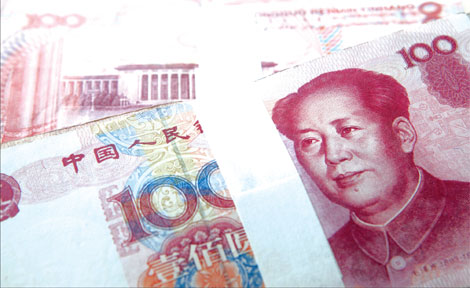HKMA: Yuan rise could boost HK assets
Updated: 2010-06-16 06:55
(HK Edition)
|
|||||||||
|
100-yuan banknotes are displayed in Beijing last year. The HKMA said this week the appreciation of the yuan could boost Hong Kong's yuan-denominated assets. Nelson Ching / Bloomberg News |
The Hong Kong Monetary Authority (HKMA), the city's de facto central bank, said local stock and property prices may rise further once the Central Government allows its currency to resume gains, thereby boosting mainland investors' appetite for assets in the city.
"A substantial appreciation of the yuan would support asset prices in Hong Kong," the HKMA said in its June Quarterly Bulletin.
Expectations of a gain "may suffice to pull capital into Hong Kong," the HKMA said in the report published on its website this week.
However, further inflows of mainland money into the city may complicate the Hong Kong government's efforts to cool home prices, which have risen 41 percent since the end of 2008.
Earlier this month, Sun Hung Kai Properties Ltd, the world's biggest developer by market value, paid HK$10.9 billion, or HK$12,540 per square foot, for a residential site at a public auction in Hong Kong, the highest price since the city's property market peaked in 1997.
Expectations for yuan appreciation have been rising after US Treasury Secretary Timothy F. Geithner said last week that China should allow more flexibility in managing the yuan. Meanwhile, the country's latest loan, inflation and export data have also fueled speculation that gains in the yuan may be allowed soon.
China's export in May surged by nearly 50 percent and the monthly trade surplus reached $19.5 billion, beating most analysts' forecast. Strong export momentum reignited talks of the country reforming its foreign exchange regime.
The impact on consumer inflation due to higher import costs will likely be "modest", the HKMA report said, adding that the impact on asset prices "could be more significant."
Figures from the Hong Kong SAR government show that the composite consumer price index has been above 2 percent in the first half of 2010, while the number was negative in mid-2009. During the same period, the benchmark Hang Seng Index largely remained above 20,000, reaching as high as 24,000.
The HKMA cited research suggesting a 10 percent gain in the yuan against the Hong Kong dollar would add 0.4 to 0.6 percentage points to the city's inflation rate. Gains in the yuan against the dollar will similarly influence the Hong Kong dollar, as the latter is pegged to the dollar.
No data were given regarding the possible impact on asset values, but "Hong Kong's equity and property markets might benefit from increased potential buyers on the mainland," the HKMA said.
China Daily-Bloomberg News
(HK Edition 06/16/2010 page3)
